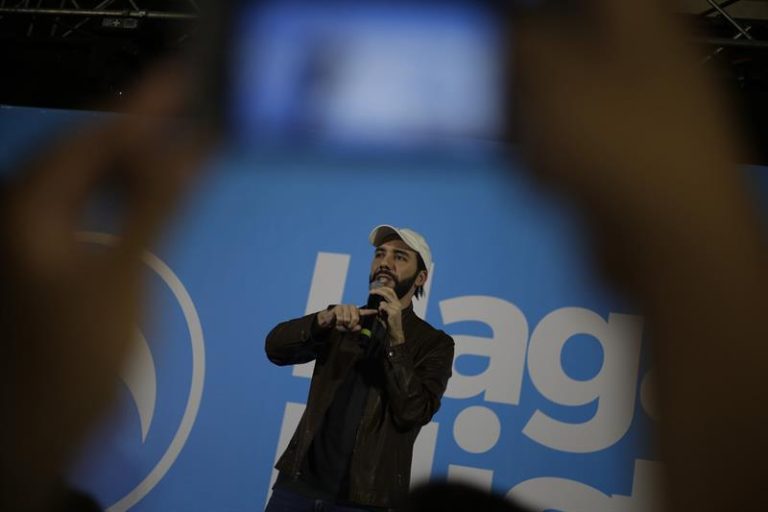3 de febrero 2019

Children of Exile: The Births “Sowing Hope” in the Camp of Nicaraguan Farmers

PUBLICIDAD 1M
PUBLICIDAD 4D
PUBLICIDAD 5D
The former mayor of San Salvador, expelled by the FMLN in 2017, compared Nicaraguan president Daniel Ortega with Somoza.

The former mayor of San Salvador
Salvadorans will elect a new president this Sunday, with Nayib Bukele, candidate of the GANA-New Ideas party, as the favorite obtaining in pre-election polls between 40.4% and 55.1%.
The former mayor of San Salvador for the FMLN, expelled from that party in 2017, tries to break with the Arena-FMLN bipartisanship that has governed the country since the peace accords of 1992. First Arena held four consecutive terms in office and then the FMLN has had the presidency since 2009.
Bukele needs to obtain more than 50% of the votes to win in the first round while his two main contenders, the businessman Carlos Calleja, candidate for a coalition of parties headed by the Republican Nationalist Alliance (Arena), receives between 19.7% and 23% in the polls; and former FMLN foreign minister Hugo Martinez, receives the sympathy of between 8.1% and 10.6% of potential voters for the current governing party.
From Bukele’s previous statements, it is clear that if the polls are confirmed, when the winner assumes the presidency of that country in June, El Salvador will stop playing the ambiguous role that it has staged before the Organization of American States, every time that continental body analyzes the situation in Nicaragua.
From the first days of the uprising in Nicaragua, Bukele was critical of the Ortega administration, as shown on April 22, at the address @nayibbukele in which the candidate tweeted: “In Nicaragua, a spark started a fire … The mistake of Ortega is to think that by putting out the spark, the fire is over,” accompanied by the labels #FuerzaNicaragua #SOSNicaragua.
On May 20th, when the world contemplated the development of the massacre by paramilitary forces at the service of the regime, the candidate tweeted that “to be coherent, the people must always be our compass. Therefore, we must support our brothers and sisters in Guatemala, Honduras, Nicaragua and Venezuela, independently if the government of the day is self-proclaimed left or right. ”
Ortega as Somoza
On July 20, Bukele was interviewed by Fernando del Rincon for the program Conclusions, which CNN broadcasts in Spanish. He began his participation in the interview saying that “the facts in Nicaragua are overwhelming”, in reference to the amount of deaths generated by the government repression.
At that time, the death toll was between 250 and 350, depending on the capacity and thoroughness of the entity that reported it. Like many in Nicaragua, the candidate adopted a humanist position, stating that “five deaths would be unacceptable, not to mention hundreds.”
In his opinion, what was happening in Nicaragua is a reaction similar to that observed “in other countries where the people no longer feel represented by their government,” especially, “since there are no democratic ways to change it”.
The candidate told the CNN journalist how the Nicaraguan presidential couple “has established itself as a controlling force”, referring to the powers of the State, as well as to the Prosecutor’s Office, the Police, the Army, and most of the media. “President and vice president are husband and wife,” he noted.
Faced with this reality he said, “people have no choice but to go out to the streets to protest – mostly in a peaceful way – but they have been repressed with brutality, as if it were an invasion, when it comes to the elderly and students.”
From that attitude, Bukele says that Ortega “behaves as Somoza behaved,” so he sees no differences between them, but many similarities.
The two “boasted of the growth the country showed, of how its economic policies had worked, and because there was a more or less apparent citizen security. However, both repressed their people, both prevented them from demonstrating freely, both murdered their populations, so I do not see any difference between Somoza and Ortega,” he insisted.
While acknowledging that Ortega’s access to power occurred “in a democratic manner,” his taste for repression “is no longer democratic. It became a dictatorship at the time it stopped allowing freedom of expression, association, and suppressed fundamental human rights,” he said.
From that “I don’t see a solution for Ortega other than an early election, his resignation, or maintaining the crisis for years in his country, at a high cost in human lives and to the economy, and Nicaragua will not support many months like this, much less years,” he concluded.
With the eventual victory of Bukele taken for granted, be it on Sunday or in a runoff election, El Salvador’s foreign policy can be expected to join the bloc of nations that in the Organization of American States (OAS) advocate applying the Democratic Charter against the Ortega regime, approaching the magic number of the twenty-four votes needed.
Archivado como:
PUBLICIDAD 3M
Periodista nicaragüense, exiliado en Costa Rica. Durante más de veinte años se ha desempeñado en CONFIDENCIAL como periodista de Economía. Antes trabajó en el semanario La Crónica, el diario La Prensa y El Nuevo Diario. Además, ha publicado en el Diario de Hoy, de El Salvador. Ha ganado en dos ocasiones el Premio a la Excelencia en Periodismo Pedro Joaquín Chamorro Cardenal, en Nicaragua.
PUBLICIDAD 3D